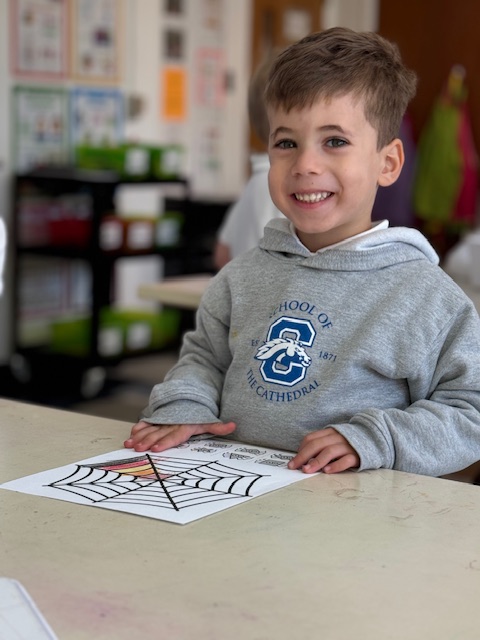PreK 4
A Premier Private PreK 4 school in Baltimore, MD.
As a private PreK 4 school in Baltimore, Maryland, The School of the Cathedral uses a variety of strategies and projects to teach the academic subjects while fostering the spiritual, social, cognitive and emotional development of our early learners. Students enjoy learning through play at our school.
The School of the Cathedral’s program is a child-centered, developmentally appropriate program for children. The purpose of the program is to establish a strong foundation for learning in the early years, and to facilitate that learning in a safe, caring, Catholic learning environment.
We offer a full day program for PreK4 with a time for rest in the afternoon. Aftercare is available for PreK4 students.
Subject Areas
Religion
The Archdiocese of Baltimore Prekindergarten Religion Curriculum provides students with their initial experience in a formal Religion class offered by our Catholic schools. The focus of the course is on the basic foundations of our Catholic faith, and similar to all other Religion courses, there is a year-long focus on Prayer, Service, and the Liturgical Year. The first half of the year introduces students to essential components to our faith, such as God, the Bible, the creation story, and the Sacraments. The second half turns to how our faith impacts our lives and discusses concepts such as friendship, morality, kindness, respect, service, and the difference between right and wrong.
Mathematics
The nine mathematical practices below describe what mathematicians do. However, they also describe essential skills outside the math classroom, both in other subjects and the real world. Students at all levels will develop these skills gradually throughout their time in Archdiocesan schools in grade-appropriate ways. This work is done nearly every day and for almost every pre-kindergarten topic
- Make sense of problems and persevere in solving them.
- Reason abstractly and quantitatively.
- Construct viable arguments and critique the reasoning of others.
- Model with mathematics.
- Use appropriate tools strategically.
- Attend to precision.
- Look for and make use of structure.
- Look for and express regularity in repeated reasoning
- Practice mathematics with a Catholic conscience.
In our Pre-kindergarten 4, students learn about
- Mathematical Practices
- Daily Routines and Practices
- Counting and Cardinality
- Operations and Algebraic Thinking
- Measurement and Data
- Numbers and Operations in Base Ten
- Geometry
English Language Arts
Below is a list of some of the skills students in pre-kindergarten will learn over the course of the school year as they develop their foundational reading skills.
- Demonstrate an awareness that words are read from left to right, top to bottom, and page by page.
- Understand that spaces separate words in print.
- Recognize and name some upper and lowercase letters of the alphabet.
- Recognize that words are made up of letters and their sounds.
- Demonstrate basic knowledge of one-to-one letter-sound correspondences by producing the most frequent sound for some consonants.
- Recognize name in print as well as some environmental print (symbols/words).
- Recognize rhyming words in spoken language.
- Identify and isolate individual words in a spoken sentence.
- Isolate and pronounce the initial sound in spoken words.
- Orally blend and segment individual phonemes in two-to-three phoneme words.
Science
Students have the opportunity to explore several aspects of what Science entails in our pre-kindergarten program. Skills that are taught include but are not limited to:
- Learn to question, test, experiment, and describe.
- Name the seasons and identify changes that happen in each season of the year.
- Observe, hypothesize, experiment, and describe.
- Name different types of weather.
- Name the five senses.
- Identify what things are made of (paper, clay, cloth, etc.).
- Use simple tools to construct designs.
- Investigate how things work.
- Experiment with ramps to compare speeds and design.
- Explore water in different forms (snow, ice, rain)
- Examine, observe, and form opinions and conclusions about nature.
- Name some ways to care for the earth (Reduce, Reuse, Recycle, clean up litter).
- Identify what an animal needs to survive.
- Name some different animal habitats.
- Sort animals by farm, pet, wild, ocean.
- Compare animal coverings.
- Examine how animals are alike and different.
- Identify ways to learn about animals.
Social Studies
During Social Studies pre-kindergarten, students learn how to be a historian, become a good citizen, be themselves, learn about their place in the world, and how to be a hard worker. Essential understandings and knowledge shared include but are not limited to:
- Understand one’s role within a family, school, and community.
- Understand how compromise can resolve conflict.
- Recognize that historians use tools to explore the past.
- Understand the importance of respecting and helping others.
- Understand what it means to be a good citizen.
- Understand what it means to be a good friend.
- Define freedom as being able to choose what your life looks like (without interference from others).
- Define “equality” as the same freedoms that all people hold.
- View ourselves as a part of a larger community.
- Understand that rules serve to support order and protect rights.
- Recognize your “safe people.”
- Know the Emergency number 9-1-1.
- Understand how compromise can help solve conflicts at home, school, and in the community.
- Understand that people have different perspectives.
- Understand that people have the right to express their opinions.
- Understand that transportation is a means of moving people from place to place.
- Recognize a map and a globe.
- Understand that our community shapes our personal identity.
- Understand that people adapt to their environments and people also adapt their environments to fit their needs.
Interested? Have questions?


